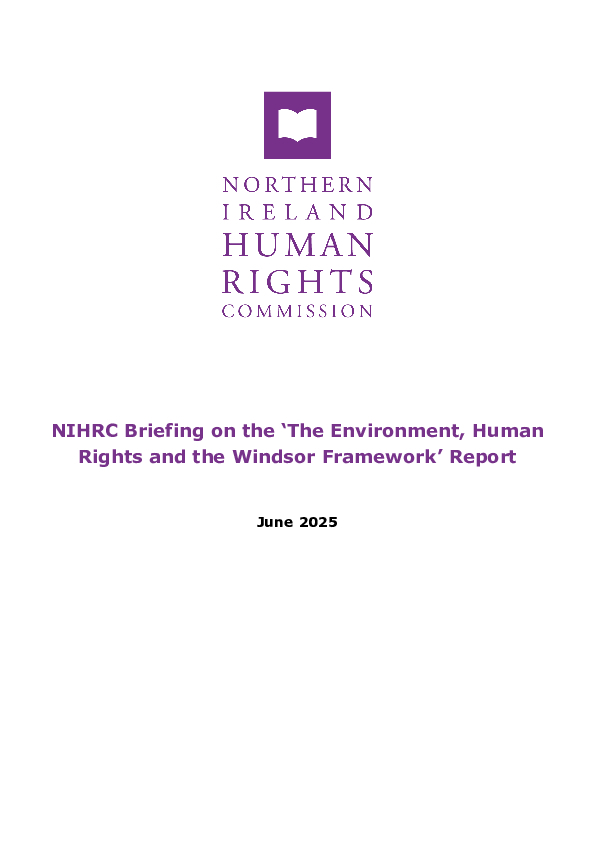NIHRC briefing on the ‘The Environment, Human Rights and the Windsor Framework’ independent research report
Context
This briefing accompanies the independent research report commissioned by the NIHRC and authored by Dr Ciara Brennan, Dr Mary Dobbs, Dr Orla Kelleher, Ms Alison Hough BL and Dr Lisa Claire Whitten titled ‘The Environment, Human Rights and the Windsor Framework’. Given the likely effect that the UK’s withdrawal from the EU would have on the legal framework regulating the environment, the NIHRC commissioned the research which considers the potential interaction between Windsor Framework Article 2, human rights and the environment.
The Commission’s position and recommendations have been informed by some of the findings of the independent report. While the independent research is broad in scope, the Commission’s advice and recommendations are narrower and focused on demonstrating how human rights linked to the environment are within scope of Windsor Framework Article 2. The Commission’s positions are grounded in the language of human rights and Windsor Framework Article 2 and reflect the Commission’s function to monitor the UK Government’s commitment to ensure certain rights are not diminished following Brexit.
Summary of recommendations
The NIHRC:
3.12 affirms the interdependent, interrelated and indivisible nature of human rights and advises that a clean and safe environment is essential for the enjoyment of human rights.
3.13 in line with ECtHR jurisprudence on the connection between the environment and human rights, advises that the commitments in the Rights, Safeguard and Equality of Opportunity Chapter of the Belfast (Good Friday) Agreement should be understood as encompassing the environmental obligations and safeguards required to realise those rights.
4.24 advises that EU environmental law that underpins commitments in the Rights, Safeguards and Equality of Opportunity Chapter of the Belfast (Good Friday) Agreement, is within the scope of Windsor Framework Article 2.
4.25 advises that rights found in the Aarhus Convention are an integral part of the EU legal order and must therefore be interpreted in line with the rights in the EU Charter of Fundamental Rights, including the right to an effective remedy in Article 47. Any diminution of these rights may be contrary to the commitment in Windsor Framework Article 2.
4.26 advises that EU minimum environmental standards include the right of individuals to challenge decisions seen to be in violation of those obligations, where such standards are capable of direct effect.
4.27 recommends that the Department of Agriculture, Environment and Rural Affairs study in detail the relevant EU environmental law and relevant CJEU jurisprudence with the objective of identifying and clarifying binding minimum standards on environmental protection that underpin human rights.
5.17 advises that the removal of Regulations 9 and 10 of the National Emissions Ceiling Regulations 2018, if not replaced, significantly diminishes the duty to tackle air pollution, below relevant EU minimum standards.
5.18 advises that the loss of EU-derived regulatory and procedural mechanisms to achieve clean air may result in a diminution of the ability of an individual to assert their right to health, such as the right to challenge air pollution derived from EU law, such as the EU Ambient Air Directive and the EU National Emission Reduction Commitments Directive.
5.19 further advises that the removal of Regulations 9 and 10 of the National Emissions Ceiling Regulations 2018 may result in a diminution of procedural environmental rights to challenge the removal of key EU-derived measures to tackle air pollution that were underpinned by the EU National Emission Reduction Commitments Directive.
5.20 advises the Department of Agriculture, Environment and Rural Affairs, the NI Office and the Department for Environment, Food and Rural Affairs to conduct in-depth analysis on the impact the removal of Regulations 9 and 10 of the National Emissions Ceiling Regulations 2018 has had on the duty to combat air pollution in NI. The removal of the statutory framework without a domestic equivalent replacing the EU minimum standards may have resulted in a diminution of rights contrary to the commitment in Windsor Framework Article 2.
If you would like to read the independent report ‘The Environment, Human Rights and The Windsor Framework’, please click on the link below:
NIHRC Independent Research Report - 'The Environment, Human Rights and the Windsor Framework'
Relevant publications

Download Documents
Your browser is out-of-date!
Update your browser to view this website correctly. Update my browser now